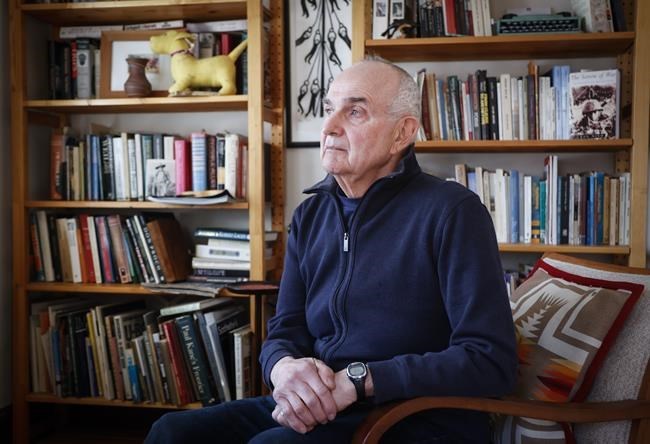EDMONTON — A Ukrainian-Canadian man in Calgary says he has been imagining the highrises around him in shambles since Russia began its invasion of Ukraine last month.
"I think, 'My God. What if this was just completely destroyed?'” George Melnyk said Tuesday, after Ukrainian President Volodymyr Zelenskyy urged Canadians to picture their own cities under attack.
"It's just who we are and where our life has been. So imagining all that wiped out ... it's devastating," said Melnyk, a 75-year-old professor emeritus of film at the University of Calgary who fled a German refugee camp with his parents in 1949.
"Can you imagine the famous CN Tower in Toronto if it was hit by Russian bombs?” Zelenskyy asked via video during a special joint session of Parliament.
“Our cities ... are not protected, just like your cities are protected — Edmonton, Vancouver. You can see that Kyiv is being shelled, being bombed … it used to be a very peaceful country, peaceful cities. Now they’re being constantly bombarded.”
The president said he is grateful to the Canadian government but is desperate for more help, including a no-fly zone to stop Russian planes and missiles.
Canada, as a member of NATO, has so far resisted Zelenskyy's pleas for a no-fly zone, fearing it would escalate the crisis by forcing NATO forces to come into direct combat with the Russian military.
Melnyk said hearing Zelenskyy say "dear Canada" made him hopeful and sad.
"He's speaking to the U.S. Congress in a couple of days in the same way. I hope that it will make some kind of impact because he's a great communicator," he said.
"At the same time, I feel really sad this guy is holed up in the capital of the country, is preparing for a huge onslaught, and who knows whether he'll survive."
The House of Commons was crowded for the first time in two years as they watched the 44-year-old leader speak. Dozens of invited guests sat in the public galleries and most MPs took their seats in person. Prime Minister Justin Trudeau said it was to show Canadian unity to support Ukraine.
Yaroslav Broda, vice-president of the Edmonton chapter of the Ukrainian Canadian Congress, said he thought Zelenskyy’s speech effectively portrayed to Canadians what it’s like to live in a war zone.
"He was trying to make it feel a little closer to home and trying to convey how Ukrainian, and even Ukrainian Canadians, have been feeling," Broda said.
Since the invasion, Broda said he has been going through pictures he took during a visit to Ukraine a few years ago. Many of the places he visited have been destroyed by Russian forces.
But Broda said he's thankful Zelenskyy acknowledged the support from the Ukrainian diaspora in Canada.
"Everybody is trying to see how they can help and what they can do, even small things like a bottle drive," he said. "I hope that it can keep going."
Broda also noted that Russia banned more than 300 Canadians, including Trudeau, from entering the country on the same day as Zelenskyy’s speech.
"I think it shows that Canada has hit a sore spot with Russia and I hope that our parliamentarians wear it as a badge of honour."
Cassian Soltykevych, the national secretary for the Ukrainian Canadian Congress, was in Parliament to watch Zelenskyy.
"It was quite a moving speech,” he said. “He had a standing ovation for several minutes after he finished. We'll see what the federal government does in the coming days."
This report by The Canadian Press was first published March 16, 2022.
---
This story was produced with the financial assistance of the Facebook and Canadian Press News Fellowship.
Fakiha Baig and Daniela Germano, The Canadian Press



